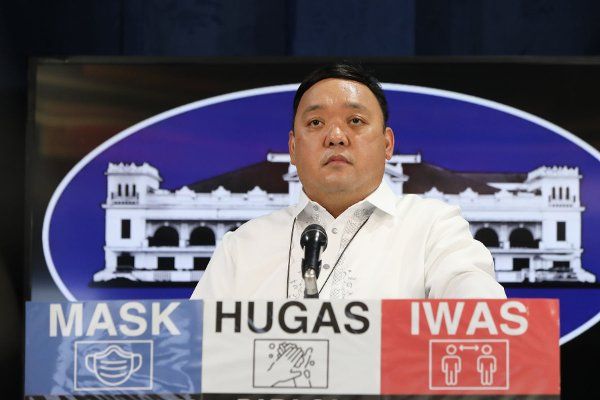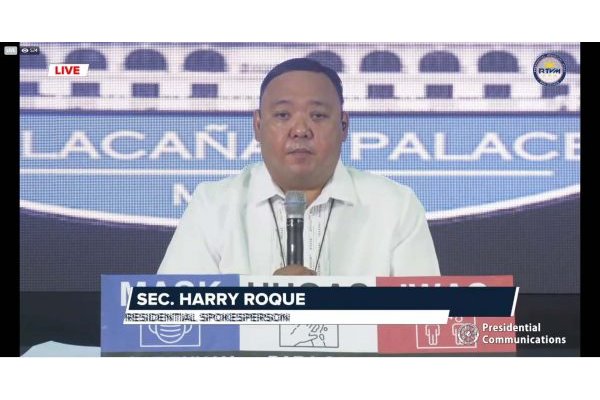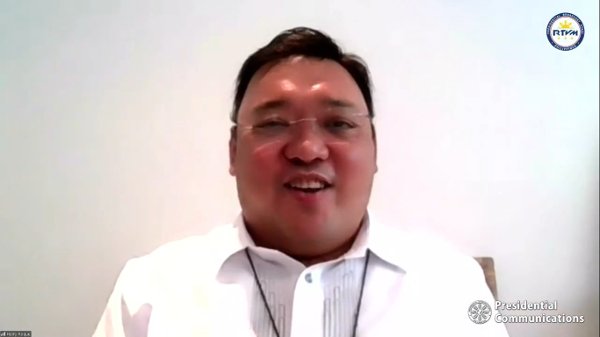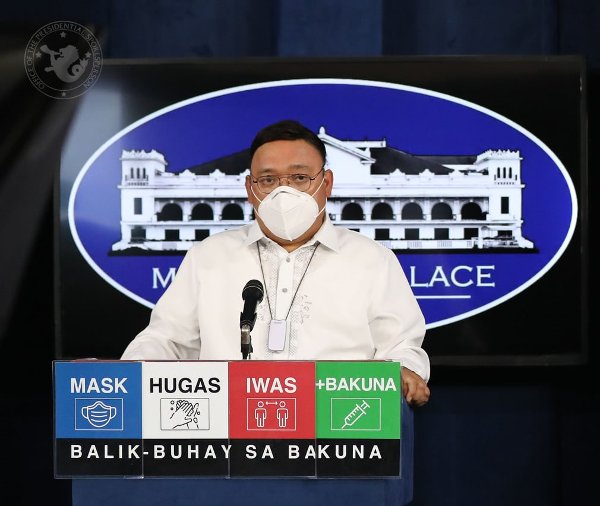From asserting, at least three times, that the government’s agreement with Chinese firm Sinovac on the procurement of vaccines against the coronavirus disease 2019 (COVID-19) was already a “done deal,” Palace Spokesperson Harry Roque now says it is “not yet final.”
The turnaround came just one day after Roque contradicted the statements of vaccine czar Carlito Galvez Jr., his deputy chief implementer Vince Dizon, and Finance Undersecretary Mark Dennis Joven, the officials directly involved in the negotiations for the procurement of the vaccines.
Watch this video:
A term sheet is the second of a three-pronged contract that the government signs with manufacturers to lock in supplies and allow the start of the production of vaccines, according to Galvez. The two other parts are the signing of confidential disclosure agreement (CDA) and the supply agreement, along with other conditions such as regulatory approval of the FDA.
Earlier, on Jan. 11, Roque, concurrently the spokesperson of the Inter-Agency Task Force for the Emerging Infectious Diseases (IATF-EID), announced that the Philippines has secured 25 million doses of Sinovac vaccine to be delivered in tranches by December, with the first batch of at least 50,000 doses expected to arrive in late February. A manufacturer needs to secure an emergency use authorization (EUA) from the Food and Drug Administration (FDA) before it can export its vaccines to the country.
In the second of three Senate hearings on the COVID vaccines on Jan. 15, senators asked Galvez, also the chief implementer of the National Task Force Against COVID-19 (NTF Against COVID-19), about various issues surrounding the government’s vaccination program, including the slow purchasing and rolling out of COVID-19 vaccines for emergency use compared with other countries.
The lawmakers also questioned the apparent preference of the government for the pricey but “less efficacious” Sinovac vaccine, which has yet to secure an EUA from the FDA as of Jan. 25. The FDA has yet to confirm the official efficacy rate of Sinovac’s jab, but clinical trials in Brazil, Indonesia, and Turkey show it’s at 50.38%, 65.30%, and 91.25%, respectively.
However, several public officials, such as Senators Nancy Binay and Panfilo Lacson, have raised concerns on the efficacy of the vaccines and suspected corruption in the deal given the disparity in prices of Sinovac vaccines offered to the Philippines compared with neighboring countries, ranging from US$5 to US$38.50 per dose. Other senators, including Minority Leader Franklin Drilon, have urged the government to be transparent in the purchase prices of the vaccines in order to build public confidence.
However, Galvez and Roque have refused to disclose the exact prices of the vaccines being procured by the government, including Sinovac, saying it could derail the negotiation and violate the CDA.
Meanwhile, Lacson reprimanded Health Secretary Franciso Duque III during the Jan. 22 Senate hearing after the latter admitted that the price of Sinovac at P3,629.50 — the figure that the Health department submitted to the Senate in December during budget deliberations — was only based on a news report “googled” by his staff.
Denying reports that the China-made vaccines cost at least P3,600 for two doses, Roque said the price is more or less P650 per jab. Galvez, meanwhile, said the government will be allowed to disclose the exact price of the vaccine only upon the signing of the supply agreement and with the concurrence of Sinovac.
Galvez, who began negotiating with vaccine companies in late 2020, told the senators that the government intends to procure vaccines from Sinovac, one of the seven manufacturers in its portfolio, to complete the 148 million doses needed to immunize at least 70 million Filipinos starting February.
As of Jan. 23, the government, in cooperation with local government units and the private sector, has signed term sheets to lock in supplies from vaccine manufacturers such as Serum Institute of India (SII) and Faberco Life Sciences (at least 30 million doses of Covovax), AstraZeneca (at least 19.6 million doses), and Sinovac (25 million doses).
Sources
Senate of the Philippines official YouTube channel, Committee of the Whole (January 15, 2021), Jan. 15, 2021
PTV, Press Briefing of Presidential Spokesperson Harry Roque, Jan. 18, 2021 (transcript)
PTV, WATCH: Press briefing with Presidential Spokesperson Harry Roque | January 19, 2021, Jan. 19, 2021 (transcript)
Senate of the Philippines, Press Release – Transcript of Sen. Nancy Binay Q&A;, Senate COW Hearing on Vaccines, Jan. 15, 2021
Presidential Communications Operations Office, PH enters into term sheet agreement for 30 million doses of Covovax, Jan. 11, 2021
Food and Drug Administration, FDA Circular No. 2020-036 || Guidelines on the Issuance of Emergency Use Authorization for Drugs and Vaccines for COVID-19, Accessed Jan. 21, 2021
Butantan Institute, Vacina do Butantan: tudo que você sempre quis saber e não tinha para quem perguntar, Accessed Jan. 22, 2021
Cabinet Secretariat of the Republic of Indonesia, BPOM Issues EUA for Sinovac COVID-19 Vaccine, Jan. 11, 2021
Turkey clinical results of Sinovac
- Nikkei asia, Sinovac’s COVID-19 vaccine has 91% efficacy, Turkey says, Dec. 25, 2020
- BBC, Sinovac: Brazil results show Chinese vaccine 50.4% effective, Jan. 13, 2021
- Reuters, Turkey says China’s Sinovac COVID vaccine 91.25% effective in late trials, Dec. 25, 2020
Senate of the Philippines, Press Release – Lacson: Differences in Sinovac Prices Smack of Corruption, Jan. 17, 2021
Senate of the Philippines, Press Release – Drilon backs more Senate hearings on gov’t Covid-19 vaccine rollout, Jan. 17, 2021
Senate of the Philippines, Press Release – Lacson Hopes Vaccine Officials Learned Hard Lesson on Transparency, Jan. 17, 2021
PTV, WATCH | National Task Force (NTF) against COVID-19 press conference in Parañaque City, (transcript), Jan. 20, 2021
Sinovac’s alleged price
- ABS-CBN News, Duterte says PH gov’t cannot divulge contract price of Sinovac’s COVID-19 vaccine, Jan. 18, 2021
- Interaksyon.com, Sinovac’s jab over P3K per dose? Gov’t denies as transparency concerns hound varying vaccine prices, Jan. 18, 2021
- CNN Philippines, China’s Sinovac near ₱650 per dose, gov’t to bare exact amount after purchase – Roque, Jan. 18, 2021
Alagang Angara, Manifestation of Sen. Sonny Angara with regard to the prices of vaccines…, Jan. 15, 2021
GMA News, Dobol B Sa News TV Livestream: January 17, 2021 – Replay, Jan. 17, 2021 (transcript)
Presidential Communications Operations Office, Safe, sure, secure vaccines to be used – Palace, Jan. 14, 2021
(Guided by the code of principles of the International Fact-Checking Network at Poynter, VERA Files tracks the false claims, flip-flops, misleading statements of public officials and figures, and debunks them with factual evidence. Find out more about this initiative and our methodology.)




